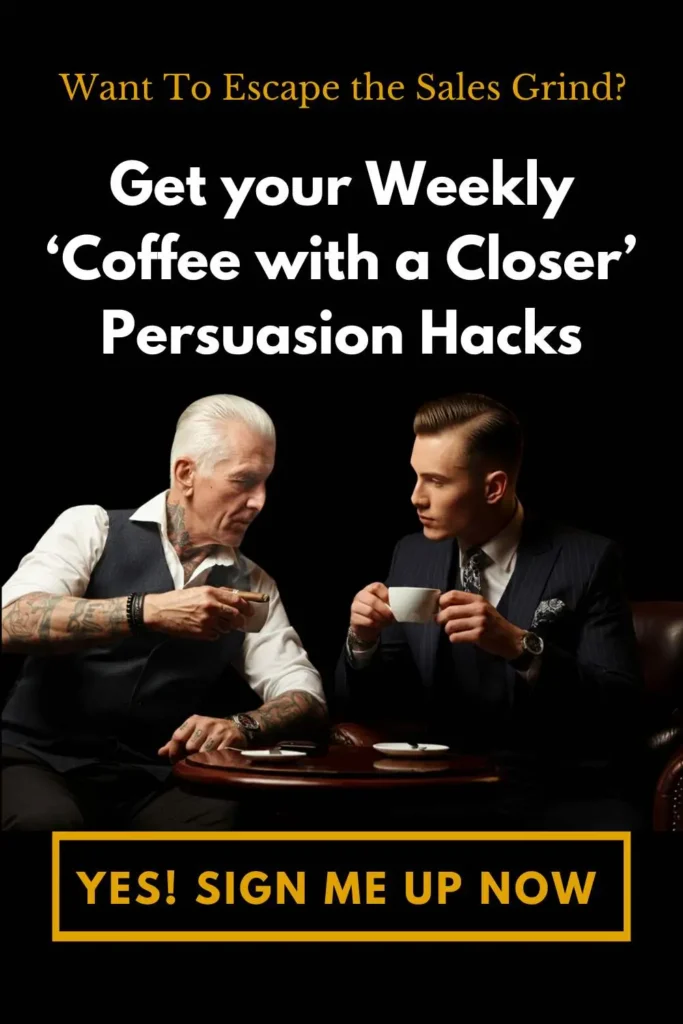Forget Features, Sell Feelings: The Value Trigger That Unlocks Wallets
Alright, you value-driven virtuosos, let’s talk about the value trigger.
Now, before you start picturing me giving a TED Talk on the meaning of life, let me tell you – this isn’t some philosophical mumbo jumbo.
This is about understanding what makes your prospects tick, what they truly care about, and how to align your pitch with their deepest values.
We’re talking about the bedrock of closing deals, the secret sauce that separates the closers from the talkers.
Done with the endless sales theory and ready to actually close more deals? If you want to skip the ‘WHY’ and get straight to the ‘HOW’?
Make “Coffee with a Closer” your next move. Get weekly, battle-tested action steps delivered directly to your inbox – no fluff, just results.
Value: It’s Not Just About the Benjamins (Though They Help)
You know, we’ve all been there – the focus on price, the relentless push for the bottom line. But what if I told you that the real goldmine lies beyond the dollar signs?
Beyond the Transaction: The Emotional Currency of Value
When we say “it’s not just about the Benjamins,” we’re talking about the emotional currency that drives purchasing decisions.
It’s the intangible, the deeply personal, the “feels.”
People don’t just buy products; they buy outcomes, experiences, and identities. They buy into a story, a vision, a feeling.
Here’s how that plays out:
The Pursuit of Aspiration:
- Think about the fitness industry. People don’t just buy gym memberships; they buy a vision of a healthier, more confident version of themselves. They’re investing in a transformation, a feeling of accomplishment.
- Luxury brands thrive on this. People buy designer handbags or watches not just for functionality, but for the status, the exclusivity, the feeling of belonging to an elite group.
The Desire for Solutions:
- In the B2B world, companies don’t just buy software; they buy solutions to their pain points. They’re investing in efficiency, productivity, and peace of mind. They’re looking for a partner who understands their challenges and can help them overcome them.
- Think of a company investing in cybersecurity. They are not just buying software, they are buying piece of mind, the security to know their data is safe, and the ability to keep their companies reputation intact.
The Connection to Values:
- Consumers are increasingly conscious of their impact on the world. They’re drawn to brands that align with their values, whether it’s sustainability, social responsibility, or ethical sourcing.
- A customer who is highly concerned with the environment will happily pay a premium for a product that is produced in a sustainable way. The value of the product to that customer, is far more than just the physical object.
The Search for Belonging:
- Brands that cultivate a strong sense of community and belonging create loyal customers who are willing to pay a premium.
- Think of the Harley Davidson brand. People buy the motorcycle, but they also buy into the lifestyle, the camaraderie, the feeling of being part of a tribe.
The Sales Pro’s Advantage: Tapping into Emotional Value
As seasoned sales pros, our advantage lies in our ability to tap into these emotional drivers. It’s about:
- Building Rapport: Establishing genuine connections with prospects, understanding their needs, and showing empathy.
- Storytelling: Crafting compelling narratives that resonate with their values and aspirations.
- Value-Based Communication: Shifting the focus from product features to the benefits and outcomes that matter most to the customer.
- Active Listening: Genuinely hearing what the customer is saying, and understanding what is not being said.
By focusing on the emotional currency of value, we can transcend the transactional and build lasting relationships with our customers.
We can become trusted advisors, partners, and even friends.
And that, my friends, is where the real value lies. Sources and related content
Understanding Your Prospect’s Value System: The Art of Value Archaeology
Think of yourself as an archaeologist, but instead of digging for ancient artifacts, you’re excavating your prospect’s core values.
It’s about recognizing that every interaction, every word, every gesture, is a clue.
Here’s how to refine your excavation techniques:
Listen Actively: Beyond the Surface
Pay attention to the nuances:
- Language Patterns: Do they use words like “innovative,” “reliable,” “community,” or “impactful”? These words are windows into their priorities.
- Tone and Emphasis: What topics ignite their passion? What points do they gloss over?
- Silence: What do they not say? Sometimes, what’s left unsaid speaks volumes.
- Examples:
- A prospect who repeatedly mentions “streamlining processes” and “reducing downtime” likely values efficiency and productivity.
- A prospect who expresses concern about “long-term partnerships” and “sustainable growth” values stability and reliability.
- A prospect who asks about the companies involvement in local charities, or how they treat their employees, values social impact.
Body Language:
- Pay attention to if they lean in, or lean away. Do they make eye contact, or avoid it? Are they relaxed, or tense?
- A person who is relaxed and makes eye contact is generally more open to new ideas.
- A person who is tense, and avoids eye contact, may be skeptical, or worried.
Ask Questions: The Power of Probing
Go beyond the standard inquiries:
- “What are your biggest challenges in achieving [desired outcome]?” This reveals their pain points and what they’re trying to overcome.
- “How do you measure success in this area?” This helps you understand their metrics and priorities.
- “What are the non-negotiables for you when making a decision like this?” This uncovers their core values and deal-breakers.
- “Tell me about a time you were really satisfied with a similar product/service.” This allows them to tell you what they value in a story format.
- “What does your ideal solution look like?” This allows the prospect to paint a picture of their desired outcome.
- Examples:
- Instead of “Do you like this feature?” ask, “How would this feature impact your daily workflow?”
- Instead of “What’s your budget?” ask, “What’s the return on investment you’re expecting?”
Observe Their Behavior: The Silent Signals
Look for patterns:
- Social Media: What content do they share or engage with? What causes do they support?
- Company Culture: What are the company’s stated values? What initiatives do they prioritize?
- Professional Networks: Who are they connected with? What groups do they belong to?
- Priorities: What meetings do they attend? What projects do they lead?
- Examples:
- A prospect who frequently shares articles about technological advancements likely values innovation.
- A prospect who volunteers for local charities likely values social responsibility.
- A prospect who has a very clean and organized office, likely values order, and efficiency.
What‘s valuable to you might be worthless to me.
Tom Fox
Real-World Examples: Value in Action
If a prospect values “innovation” and “future proofing” show them how you can help them stay ahead of market trends, and implement new technologies.
Selling a CRM System:
If a prospect emphasizes “data security” and “compliance,” highlight the system’s robust security features and adherence to industry regulations.
If a prospect emphasizes “team collaboration” and “seamless integration,” show them how the CRM fosters communication and streamlines workflows.
If a prospect emphasizes “scalability” and “future growth” show them a roadmap of how the CRM will grow with their company.
Selling a High-End Restaurant Experience:
If a prospect values “exclusivity” and “fine dining,” emphasize the restaurant’s Michelin star, rare wine selection, and personalized service.
If a prospect values “sustainability” and “local sourcing,” highlight the restaurant’s farm-to-table menu and commitment to ethical practices.
If a prospect values “family time” and “creating memories” show them the restaurants private rooms, and family style menu options.
Selling Consulting Services:
If a prospect values “speed” and “efficiency” show them your proven track record of rapid results, and quick implementations.
If a prospect values “long term partnerships” and “deep understanding” show them case studies of long term clients, and how you have helped them grow over many years.
Value: The Key to Unlocking Their Wallets (And Their Loyalty)
Once you understand your prospect’s values, you can frame your pitch in a way that resonates with their deepest beliefs.
You can show them how your product or service aligns with their values and helps them achieve their goals and aspirations.
Remember, people don’t just buy products; they buy solutions, they buy feelings, they buy a better version of themselves.
By tapping into their values, you can create a powerful emotional connection that transcends price and logic.
What’s valuable to you might be worthless to me.
Value is subjective.
What’s valuable to one person might be worthless to another.
That’s why it’s so important to understand your prospect’s individual value system.
Take me, for example.
I value quality over quantity. I’d rather buy one pair of high-quality socks that will last for years than a dozen cheap pairs that’ll fall apart after a few washes. (Yes, I’m passionate about socks. Don’t judge me.)
This reflects my value of long term value, and avoiding waste.
Ready to master the art of value-driven selling and connect with your prospect’s deepest motivations? Sign up for the “Coffee with a Closer” and receive practical techniques to uncover your prospect’s core values, craft compelling narratives, and build lasting relationships based on shared purpose and mutual benefit.
Master the Value Trigger, and You’ll Master the Sale (And Maybe Your Sock Drawer)
By understanding and leveraging the value trigger, you can create a sales experience that’s not just about closing deals, but about building relationships, creating win-win situations, and making a genuine difference in your prospect’s lives.
So, go out there and become a value-driven sales virtuoso. Your prospects (and your bank account) will thank you.

PS: Want the most powerful persuasion hacks delivered straight to your inbox? Sign up for the “Coffee with a Closer” today!


